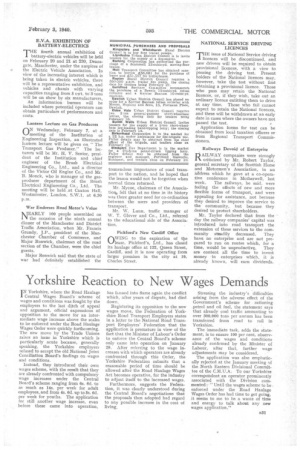Yorkshire Reaction to New Wages Demands
Page 51

If you've noticed an error in this article please click here to report it so we can fix it.
I N Yorkshire, where the Road Haulage Central Wages Board's scheme of wages and conditions was fought by the employers to the last ditch of appeal and argument, official expressions of opposition to the move for an intermediate wage increase above the scales to be enforced under the Road Haulage Wages Order were quickly forthcoming. The new move by the Trade Unions raises an issue in Yorkshire which is particularly acute because, generally speaking, the Yorkshire employers refused to accept the old National Joint Conciliation Board's findings on wages and conditions.
Instead, they introduced their own wages scheme, with the result that they are already confronted with compulsory wage increases under the Central Board's scheme ranging from 6s. 6d. to as much as 14s. per week for adult employees, and from 4s. 6d. up to 5s. 6d. per week for youths. The application for still another wage increase, even before these came into operation, has fanned into flame again the conflict which, after years of dispute, had died down.
Registering its opposition to the new wages move, the Federation of Yorkshire Road Transport Employers states in a letter to the National Road Transport Employers' Federation that the application is premature in view of the fact that the Minister of Labour's Order to enforce the Central Board's scheme only came into operation on January 29. After referring to the wage increases with which operators are already confronted through this Order, the Yorkshire Federation submits that a reasonable period of time should be allowed after the Road Haulage Wages Act becomes operative, for the industry to adjust itself to the increased wages.
Furthermore, suggests the Federation, it was clearly understood during the Central Board's negotiations that the proposals then adopted had regard to any possible increase in the cost of living.
Stressing the industry's difficulties arising from the adverse effect of the Government's scheme for rationingpetrol and oil fuel, the statement says that already coal traffic amounting to over 300,000 tons per annum has been transferred from road to rail in Yorkshire,
The immediate task, adds the statement, is to ensure 100 per cent, observance of the wages and conditions already confirmed by the Minister of Labour, after that, further wage adjustments may be considered.
The application was also emphatically rejected at the January meeting of the North Eastern Divisional Committee of the C.M.U.A. To our Yorkshire correspondent an operator prominently associated with the Division commented :• " Until the wages scheme to be enforced under the Road Haulage Wages Order has had time to get going, it seems to me to be a waste of time and energy to talk about any new wages application."








































































































